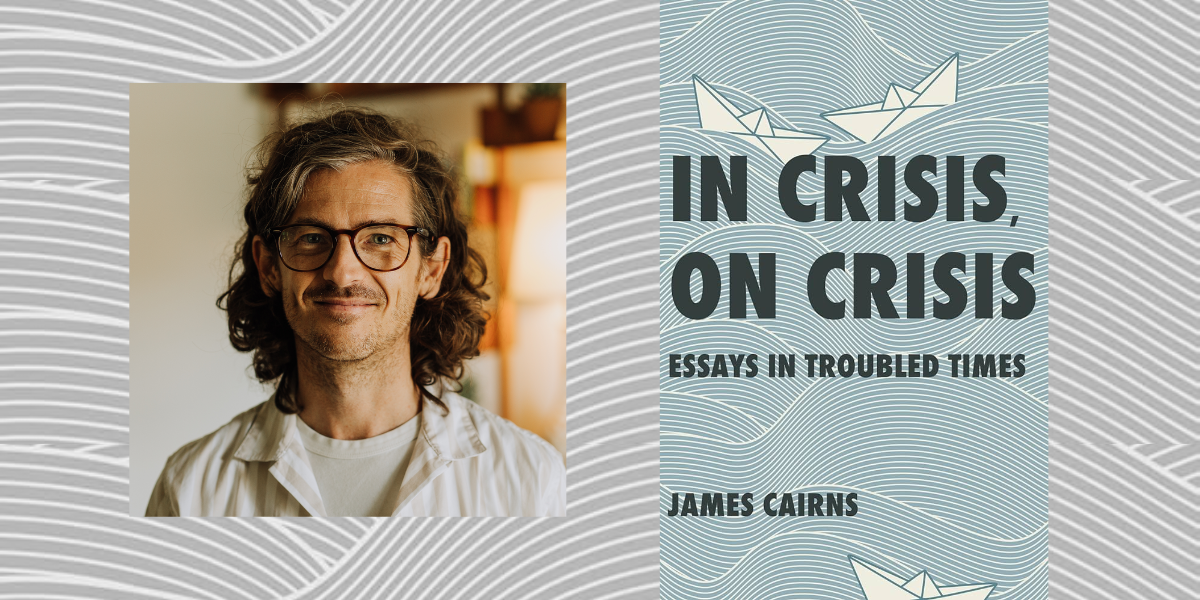James Cairns’ collection of essays begins by examining the questions one would expect from an academic book on “crisis”: What is a crisis? Who defines a crisis? Why is this considered a crisis, but not that?
The answers are not simple. For Cairns — an avid reader of fiction and professor of political theory and social movements at Wilfrid Laurier University — exploring crisis requires turning to Daoist conceptions of crisis, the writings of Nancy Fraser, the post-apocalyptic landscape of Cormac McCarthy’s The Road, Gramsci’s Prison Notebooks, and, unexpectedly, a tantrum thrown by his then-three-year-old son, Gus. These concepts and references appear within pages – or sometimes even sentences – of one another, yet never feel out of place. This coherence across intellectual and personal terrain is a core strength of Cairns as both a writer and researcher.
Things take a surprising turn early in the first chapter when Cairns pauses his academic analysis to reveal that his fascination with crisis is also deeply personal — specifically the result of an over two-decade struggle with alcoholism. In unflinching detail, Cairns recounts self-destructive episodes that eventually led him to realize that he was, himself, in crisis. This thread of personal vulnerability appears throughout the book and serves as a kind of anchor for his broader analysis. Cairns’ willingness to be vulnerable, and to drift from academic analysis to memoir style writing, allows him to draw the unique and thought-provoking connections that make this book intellectually rich and emotionally resonate. Further, his dry, self-aware humor also cuts through the heaviness at key moments, adding levity and depth to his reflections.
In The Worse, The Better, titled after the old revolutionary maxim suggesting that deteriorating social conditions could prompt radical change, Cairns responds to the accelerationist arguments he has encountered among his students and others on the left. He firmly rejects this reactionary logic, instead arguing that the framing of crisis could be useful not because it guarantees revolution, but because it “unleash[es] new possibilities for progressive collective action.” Crisis, for Cairns, is neither wholly good nor wholly bad — it is a juncture of potential.
This theme continues in Google Alerts, where Cairns details his informal study of how the term “crisis” appeared online in relation to liberal democracy from summer 2019 to 2022. He critiques liberal commentators who frequently proclaim democracy to be “in crisis,” arguing that liberal democracy has always been enshrined within a system where capitalist property and power relations are beyond democratic control, thus preventing any elected official from undermining the economic dominance of capitalist interests. The takeaway: declarations that “democracy is in crisis” often express a “much less clear, amorphous feeling that everything is totally fucked up.” Still, Cairns insists, there is both real danger and radical potential in assuming that liberal democracy is broken.
The more overtly political essays are bookended by ones more literary and personal — such as My Struggle and My Struggle, On the Pleasures of Reading the Apocalypse, Against Fatalism, and Crisis Moves. I found these particularly engaging, though a reader’s enjoyment will likely depend on their familiarity with and interest in the authors and subjects that captivate Cairns, including Karl Ove Knausgaard, Sylvia Plath, and apocalyptic speculative fiction.
The collection shines brightest when Cairns directly blends the personal and political in ways that are compelling and chilling. The final two essays — On Fearing Uncertainty: Parenting Amid the Eco-Crisis and Blackout — are standout examples. In the former, Cairns grapples with the anxiety many leftist parents will recognize: how to reconcile the fear that something terrible will happen to his children with the knowledge that the climate crisis is rapidly worsening and will inevitably shape their futures. The latter essay offers a raw, philosophical meditation on addiction, in which Cairns draws on Walter Benjamin’s concept of “empty time” to reframe his alcoholic blackouts, and imagines his decision to quit drinking as a kind of messianic rupture. In less capable hands, this could come off as trite or self-aggrandizing, but here it becomes a powerful, uniquely revolutionary, thought experiment in self-transformation.
Readers on the far-left will likely have varied takeaways from this book. It offers no clearly defined prescriptions, and the more politically focused essays emphasize critique and conceptual framing over concrete guidance for political organizing. While some may find this to be a limitation, it’s also part of the book’s strength — it invites readers to reflect on their own relationship to crisis and develop their own conclusions.
Others may critique Cairns’ standpoint: despite his personal struggles, he is a tenured professor with a loving family, and the ability to purchase a home in a region unaffordable to many. However, Cairns’ privilege also afforded him the space and freedom to produce an honest, probing, and unusually self-aware work that speaks directly to the despair and disorientation many revolutionaries face, while contributing meaningfully to the underexplored intersection of addiction and socialist thought.
In Crisis, On Crisis does not offer clarity or closure – and that is precisely what makes it vital. For readers willing to wrestle with contradiction and ambiguity, Cairns offers not a roadmap, but a mirror – one that reflects the fractured, uncertain terrain of our times and the radical potential buried within it.
Did you like this article? Help us produce more like it by donating $1, $2, or $5. Donate

